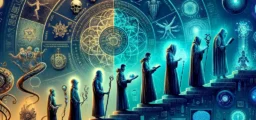Future Directions in Spirituality Research

The exploration of spirituality has traditionally been the purview of philosophers, theologians, and, to some extent, psychologists. However, with the advent of interdisciplinary research and advanced technology, our understanding of spirituality and its effects on human life is poised for revolutionary insights. We will discuss the exciting prospects and future directions in spirituality research here.
1. Neurotheology and the Science of Spirituality
At the intersection of neuroscience and spirituality is the emerging field of neurotheology. This discipline seeks to understand the neurological basis of spiritual and religious experiences. Neuropathologists utilize brain-imaging technologies such as MRI and EEG to map brain activity during meditation, prayer, or mystical experiences.
Future research aims to discern the universal elements of spiritual experiences across different cultures and religions. This pursuit could lead to a deeper understanding of the neurological processes underlying spiritual experiences, revealing more about the nature of consciousness and the brain’s role in our spiritual perceptions.
2. Spirituality and Mental Health
Numerous studies have highlighted the positive correlation between spirituality and mental health. Spirituality often provides a sense of purpose, improves resilience, and promotes positive coping strategies. As mental health issues continue to rise globally, further research into the role of spirituality as a protective and therapeutic factor becomes even more crucial.
Future research will likely involve more randomized controlled trials to assess the effectiveness of spiritually-integrated psychotherapy, exploring how spiritual beliefs and practices can be more effectively harnessed in therapeutic settings. The ultimate goal is to create a holistic approach to mental health that values and incorporates the spiritual dimension of the human experience.
3. The Role of Artificial Intelligence in Spirituality Research
Artificial intelligence (AI) has vast potential in spirituality research. AI algorithms could help analyze large volumes of qualitative and quantitative data on spiritual experiences, beliefs, and practices, revealing patterns and insights that would be impossible for humans to detect unaided.
Future research may also explore AI’s role in personal spiritual development. For instance, AI could be programmed to provide personalized spiritual guidance based on an individual’s beliefs, values, and emotional state. While this idea may seem far-fetched, it could open new avenues for personalized spiritual growth and understanding in an increasingly digital world.
4. The Rise of Non-Religious Spirituality
A significant trend in recent years has been the growth of people identifying as “spiritual but not religious.” These individuals value personal spiritual experience over adherence to religious doctrines. This shift necessitates broadening spirituality research to encompass non-religious spiritual beliefs and experiences.
Future research will delve into this population’s unique spiritual experiences and challenges, potentially leading to new spiritual practices and frameworks that resonate with non-religious but spiritually-inclined individuals.
5. The Integration of Quantum Physics and Spirituality
With its counter-intuitive concepts like quantum entanglement and superposition, Quantum physics has been at the forefront of debates about the nature of reality. Some scientists and philosophers have suggested parallels between quantum physics and mystical or spiritual insights. Future research may explore these parallels, potentially unveiling a profound synthesis of science and spirituality that could revolutionize our understanding of reality.
In conclusion, the future of spirituality research is a tapestry of exciting possibilities and potential. As we move into this brave new world of interdisciplinary collaboration, cutting-edge technology, and evolving spiritual demographics, we are poised to gain unprecedented insights into one of humanity’s most timeless quests—the search for spiritual understanding and transcendence. As we continue this journey of exploration, we may yet discover that the future of spirituality research holds the key to a deeper understanding of ourselves and the universe we inhabit.






Comments are closed.